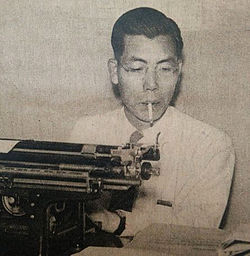 Kiyokawa Masaji in 1948 | ||||||||||||||||||
| Personal information | ||||||||||||||||||
|---|---|---|---|---|---|---|---|---|---|---|---|---|---|---|---|---|---|---|
| Native name | 清川 正二 | |||||||||||||||||
| Nationality | Japanese | |||||||||||||||||
| Born | February 11, 1913 Toyohashi, Aichi, Japan | |||||||||||||||||
| Died | April 13, 1999 (aged 86) Tokyo, Japan | |||||||||||||||||
| Sport | ||||||||||||||||||
| Sport | Swimming | |||||||||||||||||
| Strokes | backstroke | |||||||||||||||||
Medal record
| ||||||||||||||||||
Masaji Kiyokawa (清川 正二, Kiyokawa Masaji, February 11, 1913 – April 13, 1999) was a Japanese businessman, sports administrator and backstroke swimmer who won two medals at the 1932 and 1936 Olympics. During his swimming career Kiyokawa set one world record, in the 400-metre backstroke.[1]
Kiyokawa was born in Toyohashi, Aichi Prefecture, and graduated from the Tokyo College of Commerce (now Hitotsubashi University). Selected as a member of the Japanese swimming team at the 1932 Los Angeles Olympics, he won the gold medal in the 100 m backstroke event, with teammates Toshio Irie and Kentaro Kawatsu taking the silver and bronze. At the 1936 Berlin Olympics, he placed third in the same event.[1]
In 1948, Kiyokawa became a director of the Japan Swimming Federation, and a member of the International Olympic Committee from 1975 to 1989, serving as vice chairman from 1979 to 1983. During his tenure, the city of Nagoya made a bid for the 1988 Summer Olympics, competing against Seoul, South Korea. Kiyokawa was critical of the large amounts of money being spent by both parties to entertain and influence the votes of the IOC members. He was also critical of the decision of the Japanese government to bow to political pressure from the United States to boycott the 1980 Summer Olympics in Moscow.[1]
Kiyokawa was the CEO of the general trading company Kanematsu Corp. from 1976. He died of pancreatic cancer.[1]
See also
[edit]References
[edit]- ^ a b c d Evans, Hilary; Gjerde, Arild; Heijmans, Jeroen; Mallon, Bill; et al. "Masaji Kiyokawa". Olympics at Sports-Reference.com. Sports Reference LLC. Archived from the original on December 3, 2016.
Further reading
[edit]- Killanin, Michael Morris. The Olympic games, 1984: Los Angeles and Sarajevo. John Rodda (1983) ISBN 0718123905
- Lohn, John. Historical Dictionary of Competitive Swimming. Scarecrow Press, (2010). ISBN 0810867753
- Mallon Bill. Historical Dictionary of the Olympic Movement. Scarecrow Press (2011). ISBN 0810872498
External links
[edit]- Masaji Kiyokawa at World Aquatics
- Masaji Kiyokawa at Olympics.com
- Masaji Kiyokawa at Olympedia
- Masaji Kiyokawa at databaseOlympics.com (archived)
- Japanese Olympic Committee database Archived February 19, 2014, at the Wayback Machine
Well, that’s interesting to know that Psilotum nudum are known as whisk ferns. Psilotum nudum is the commoner species of the two. While the P. flaccidum is a rare species and is found in the tropical islands. Both the species are usually epiphytic in habit and grow upon tree ferns. These species may also be terrestrial and grow in humus or in the crevices of the rocks.
View the detailed Guide of Psilotum nudum: Detailed Study Of Psilotum Nudum (Whisk Fern), Classification, Anatomy, Reproduction